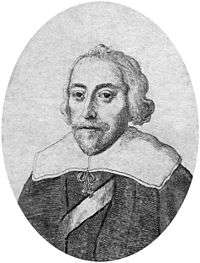Oliver St John, 1st Earl of Bolingbroke
Oliver St John, 1st Earl of Bolingbroke (1580? – June/July 1646), known from 1618 until 1624 as 4th Baron St John of Bletso, was an English nobleman and politician.

1st Earl of Bolingbroke.
Life
St John was son and heir of Oliver St John, 3rd Baron St John of Bletso, by his wife Dorothy Reid, daughter and heiress of Sir John Rede or Reid, of Oddington, Gloucestershire. He matriculated from Peterhouse, Cambridge, in about 1595 and was admitted at Gray's Inn on 20 April 1597.[1]
St John was in parliament, elected as member for Bedfordshire in 1601, and again in 1604.[2] In 1604 he served on the committee appointed to discuss the change in the royal title. On 3 June 1610 he was made knight of the Bath at the creation of Henry Frederick, Prince of Wales. In September 1618 he succeeded his father; in the following year he sumptuously entertained James I at his house, and in 1620 he took his seat in the House of Lords. On 28 December 1624 he was created Earl of Bolingbroke (a manor that had belonged to the Beauchamp family, from which he was descended). He took his seat on 22 June 1625.
In December 1626 St John refused to contribute to the forced loan; but in 1638–9 he contributed towards the expenses of the Bishops' War. On 28 August 1640 he signed the petition of the twelve peers, attributing the evils of the day to the absence of parliaments, and urging Charles I to summon one. He remained with the Long Parliament in 1642 when Charles retired to York, and in February 1642–3 was named by the parliament lord lieutenant of Bedfordshire; in this capacity he took an active part in raising the militia and providing for the safety of the shire. In the same year he took the Solemn League and Covenant, and was appointed a lay member of the Westminster Assembly. On 10 November he was one of the commissioners named for the custody of the Great Seal. In 1645 he was excused attendance at the House of Lords, and he died in June or July 1646.
Family
St John married, in April 1602, Elizabeth, daughter of William Paulet and granddaughter of Sir George Paulet, brother of William Paulet, 1st Marquess of Winchester. They had four sons and three daughters:
- Oliver St John, 5th Baron St John of Bletso (1603–1642), married Lady Abrabella Egerton and left four daughters
- Sir Paulet St John, KB (d. 1638), married Elizabeth, daughter of Sir Rowland Vaughan (d. 1641) of St Mary Spital and had three sons:
- Oliver St John, 2nd Earl of Bolingbroke (d. 1688)
- Paulet St John, 3rd Earl of Bolingbroke (1634–1711)
- Francis St John, educated at Corpus Christi College, Cambridge, died unmarried
- Francis St John, died unmarried
- Anthony St John (c.1618–1673), married Ann Keynsham (d. 1700), of Tempsford
- Elizabeth St John, died young
- Dorothy St John (d. 1628), married John Carey, 2nd Earl of Dover, without issue
- Barbara St John, died young
His eldest son Oliver was mortally wounded at the Battle of Edgehill in 1642 and predeceased him, leaving only daughters. When Bolingbroke died in 1646, the earldom passed to his grandson Oliver, the eldest son of Bolingbroke's second son Sir Paulet St John.
His five younger brothers, Rowland, Anthony, Alexander, Beauchamp and Henry all became MPs. [3]
References
- "St John, Oliver (ST595O)". A Cambridge Alumni Database. University of Cambridge.
- History of Parliament Online - Oliver St John
- "ST. JOHN, Oliver I (c.1583-1646), of Bletsoe, Beds. of Abbot's Ripton, Hunts. and St. Bartholomew-the-Great, London". History of Parliament Trust. Retrieved 14 August 2019.
- . Dictionary of National Biography. London: Smith, Elder & Co. 1885–1900.
| Parliament of England | ||
|---|---|---|
| Preceded by Edward Radclyffe Nicholas Luke |
Member of Parliament for Bedfordshire 1601–1611 With: Sir Edward Radclyffe |
Succeeded by Sir Henry Grey Sir Oliver Luke |
| Political offices | ||
| Preceded by The Lord St John of Bletso |
Lord Lieutenant of Huntingdonshire 1619–1627 With: The Duke of Lennox 1619–1624 The Earl of Manchester 1624–1627 |
Succeeded by The Earl of Manchester |
| Preceded by The Earl of Manchester |
Lord Lieutenant of Huntingdonshire 1629–1636 With: The Earl of Manchester |
Succeeded by The Earl of Manchester |
| Preceded by The Earl of Kent |
Lord Lieutenant of Bedfordshire (Parliamentary) 1639–1646 |
Succeeded by Disputed |
| Peerage of England | ||
| New creation | Earl of Bolingbroke 1620–1646 |
Succeeded by Oliver St John |
| Preceded by Oliver St John |
Baron St John of Bletso 1618–1641 |
Succeeded by Oliver St John |
| Preceded by Oliver St John |
Baron St John of Bletso 1642–1646 |
Succeeded by Oliver St John |